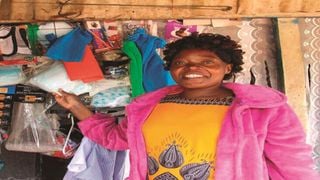
Julie Anyango, a businesswoman, during the interview in Kawangware, Nairobi, last month.
| Lucy Wanjiru | Nation Media GroupHow Kenya’s domestic workers turned their lives around during pandemic
What you need to know:
- Some domestic workers have managed to turn the tide and start their own businesses thanks to the Inua Mama Fua project in Nairobi.
- Lack of access to social protection systems has made these women particularly vulnerable to the Covid-19 pandemic.
Julia Anyango, 31, lost her domestic worker job when her foreign employers moved back from Kenya to their home country in December last year.
Disoriented by the abrupt unemployment, the single mother of three in the low-income residential area of Kawangware, Nairobi, quickly got a cleaning job at a Chinese restaurant at Yaya Centre.
But business was slow due to Covid-19 and the restaurant shut down. Ms Anyango lost her job again. Determined to move on, she started a tailoring and hairdressing business. She had learnt skills from a course she took 16 years earlier, after dropping out of school.
“I worked for the Chinese restaurant for four months and spent part of my salary purchasing salon equipment,” she says.
Ms Anyango opened her business last February. She uses a friend’s sewing machine for her tailoring business, while the salon work is predominantly plaiting of hair. For now, the Sh3,000 profit she makes monthly is thinly spread out to meet her housing and food expenses.
Her resilience has earned her a place in a post Covid-19 recovery initiative for female domestic workers in Kenya. She is one of the 60 women who are benefiting from the project, called Inua Mama Fua (‘Lift up the cleaning lady’ in Swahili), launched in April 2020 by the Dhobi Women Network, an organisation devoted to empowering female domestic workers in Kenya.

Rose Nyangiza selling her merchandise outside Paramount Plaza in Ngara, Nairobi, on May 21, 2021. Prior to Covid-19, Ms Nyangiza worked as a domestic worker in Nairobi.
According to the UN, there are approximately 67 million domestic workers worldwide, majority of whom are women. While trying to maintain their livelihoods, the lack of access to social protection systems has made them particularly vulnerable to the Covid-19 pandemic.
Under the initiative’s umbrella, these women, who live in Nairobi’s low-income areas, can access loans of up to Sh15,000 to boost their businesses or start new ones. To access these loans, however, they have to be part of a table banking group.
Grace Ngugi, executive director of the Dhobi Women Network, says the women will receive the loans with a refund interest of 2.5 per cent,out of which one per cent is reinvested into their table banking groups and 1.5 per cent covers administration costs.
Domestic workers are a key portion of Kenya’s informal economic sector, in which 767,900 new jobs were created in 2019, according to a 2020 economic survey conducted by the Kenya National Bureau of Statistics.
“Women are the backbone of this country’s economy. When they lose their jobs, their families suffer,” says Ms Ngugi.
The Inua Mama Fua project, which won the 2021 Ruth Bader Ginsburg Legacy Prize awarded by the World Justice Project, has been lauded as exemplary for its fight against gender inequality.
'Mama fua’ job
Like Ms Anyango, Rose Nyangiza was also able to turn her life around thanks to this initiative.
The 47-year-old created her own micro-business sells assorted merchandise after giving up having a mama fua job that had turned out to be exploitative.
“I did casual cleaning jobs to raise an income to feed my three children,” she says. She could do a job worth Sh250, but ended up being paid Sh150 instead or worse, not being paid at all.
“Some would pay me three to four days later and, at the time (in the midst of Covid-19), the jobs were rarely coming by. If I was lucky, I would work twice a week,” she says.
She gave up on the ‘mama fua’ job 17 months later and started hawking sweets. She spent Sh800 to buy sweets. She later joined a table banking group where she saved Sh50 per week and later got a loan of Sh1,200, which she used to buy more sweets and socks.
Her business has since grown to a stock worth more than Sh6,000. She sells from her open stall outside Paramount Plaza in Ngara, Nairobi.





